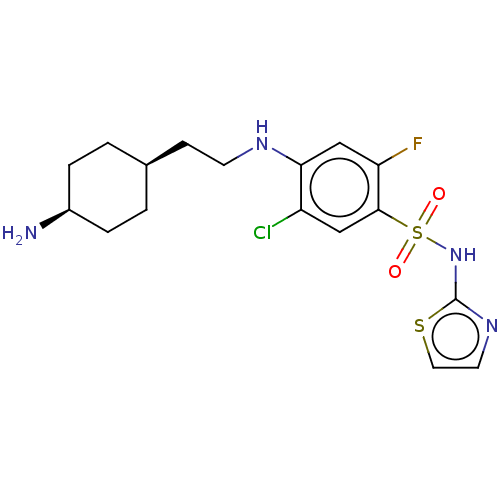BDBM50237522 CHEMBL4060154::US10836758, Example 17
SMILES N[C@H]1CC[C@@H](CCNc2cc(F)c(cc2Cl)S(=O)(=O)Nc2nccs2)CC1
InChI Key InChIKey=GPWHPAPWDUMHKB-TXEJJXNPSA-N
Data 4 IC50
Activity Spreadsheet -- Enzyme Inhibition Constant Data from BindingDB
 Found 4 hits for monomerid = 50237522
Found 4 hits for monomerid = 50237522
Affinity DataIC50: 2.00E+4nMAssay Description:Inhibition of human CYP3A4 assessed as inhibition of dealkylationMore data for this Ligand-Target Pair
TargetSodium channel protein type 9 subunit alpha(Homo sapiens (Human))
Bristol-Myers Squibb
US Patent
Bristol-Myers Squibb
US Patent
Affinity DataIC50: 9nMAssay Description:hNaV1.7 binding affinities were determined with a filtration binding assay using purified membranes from HEK293 cells stably expressing hNaV1.7. HEK2...More data for this Ligand-Target Pair
TargetSodium channel protein type 9 subunit alpha(Homo sapiens (Human))
Bristol-Myers Squibb
US Patent
Bristol-Myers Squibb
US Patent
Affinity DataIC50: 8nMAssay Description:Inhibition of recombinant human Nav1.7 expressed in HEK293 cells assessed as reduction in peak inward current at -60 mV holding potential measured af...More data for this Ligand-Target Pair
TargetSodium channel protein type 5 subunit alpha(Homo sapiens (Human))
Bristol-Myers Squibb
Curated by ChEMBL
Bristol-Myers Squibb
Curated by ChEMBL
Affinity DataIC50: 4.90E+3nMAssay Description:Inhibition of recombinant human Nav1.5 expressed in HEK293 cells assessed as reduction in peak inward current at -50 mV holding potential measured af...More data for this Ligand-Target Pair
